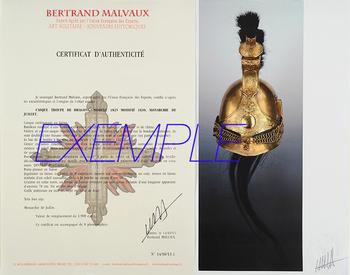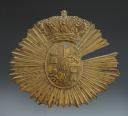
SPANISH ARMY INFANTRY CASKET PLATE, model 1828, reign of Isabel II. 26339
Sold out
SPANISH ARMY INFANTRY CASKET PLATE, model 1828, reign of Isabel II. 26339
Plate for line infantry.
In brass stamped with a radiant sun with the arms of the Kingdom of Spain in its center, topped with the royal crown.
H 10.3 cm, width 11.8 cm.
Kingdom of Spain.
Reign of Isabella II (1833-1868).
Fairly good condition, one spoke missing.
BIOGRAPHY :
Isabella II (or Isabel II in Spanish), born October 10, 1830 in Madrid and died April 9, 1904 in Paris1, was Queen of Spain from 1833 to 1868.
HISTORY:
This shako plate dates from the First Carlist War
The First Carlist War was a civil war that took place in Spain between 1833 and 1839, with significant international repercussions. It begins with the death of Ferdinand VII which causes a crisis between the regent Marie-Christine, Ferdinand's wife, and his brother, Charles (Don Carlos).
Maria Christina of Spain, widow of Ferdinand VII and mother of Isabella II, exercised the regency during her daughter's minority. Painting made by Winterhalter in 1841.
It continued in a diplomatic crisis between France and Great Britain in the 1840s.
The succession crisis of 1833
In 1833, King Ferdinand VII died after designating his daughter Isabella, aged only three, as his successor, thus depriving his brother Charles of the throne.
The nobility supported the more conservative Infante Charles against the liberals who took the side of the regent.
A civil war ensued between the supporters of the young queen and the Carlists.
Civil war and foreign intervention
This civil war had its consequences felt especially in the north of the country, the Carlists being particularly strong in the Basque provinces and Navarre, who defended their privileges (fors) against the centralizing liberals.
Under the leadership of General Zumalacárregui, an army of 13,000 Carlists won a series of victories, but the government army established a line of defense (Bilbao-Vitoria-Ebro Valley) which the Carlists were unable to break.
Isabel II's troops will then benefit from external aid. In 1834, France, Portugal and the United Kingdom signed the Quadruple Alliance treaty with the Spanish government. The United Kingdom sends a group of volunteers (the British Legion). King Louis-Philippe ceded the Foreign Legion to Spain, which then fought in Algeria and arrived in Spain in August 1835 (the Legion officially became part of the Spanish army).
The war ended in 1839 with the Ognate Convention (or Vergara Convention) of August 29, 1839 by which the Carlists recognized their defeat.
The Franco-British crisis over the Spanish succession (1846)
France, having achieved victory, believes it has acquired a monopoly of influence over Spain, a monopoly called into question by the United Kingdom. A friendly understanding had been established in Eu between Louis-Philippe I and Queen Victoria regarding the marriage of the young queen in Spain, French influence being confirmed there. But the fall of the Peel government in 1846 changed the climate of Franco-British relations and the return of Palmerston - stubbornly anti-French - to foreign affairs, revived the rivalry of the two countries.
Lord Palmerston and the conduct of Sir Henry Bulwer (future Lord Dalling) in Madrid led Guizot to believe that the agreement was broken, and that it was planned to put a Saxe-Coburg on the Spanish throne.
Determined to resist such an intrigue, Guizot and King Louis-Philippe I precipitately launched into a counter-plot completely contrary to their commitment to the United Kingdom and fatal to the happiness of the Queen of Spain. By their influence, she was pushed to marry her first cousin François de Bourbon, and her sister married to the youngest son of the king of the French, in violation of the promises of Louis-Philippe. Although this action was carried out at a time of triumph in French politics, it was in truth fatal to the monarchy by helping to discredit the minister.
Its immediate effect was the breakdown of the Franco-British alliance, throwing Guizot into closer cooperation with the absolutist Metternich and the courts of northern Europe. In France, this rapprochement displeases liberals.
Plate for line infantry.
In brass stamped with a radiant sun with the arms of the Kingdom of Spain in its center, topped with the royal crown.
H 10.3 cm, width 11.8 cm.
Kingdom of Spain.
Reign of Isabella II (1833-1868).
Fairly good condition, one spoke missing.
BIOGRAPHY :
Isabella II (or Isabel II in Spanish), born October 10, 1830 in Madrid and died April 9, 1904 in Paris1, was Queen of Spain from 1833 to 1868.
HISTORY:
This shako plate dates from the First Carlist War
The First Carlist War was a civil war that took place in Spain between 1833 and 1839, with significant international repercussions. It begins with the death of Ferdinand VII which causes a crisis between the regent Marie-Christine, Ferdinand's wife, and his brother, Charles (Don Carlos).
Maria Christina of Spain, widow of Ferdinand VII and mother of Isabella II, exercised the regency during her daughter's minority. Painting made by Winterhalter in 1841.
It continued in a diplomatic crisis between France and Great Britain in the 1840s.
The succession crisis of 1833
In 1833, King Ferdinand VII died after designating his daughter Isabella, aged only three, as his successor, thus depriving his brother Charles of the throne.
The nobility supported the more conservative Infante Charles against the liberals who took the side of the regent.
A civil war ensued between the supporters of the young queen and the Carlists.
Civil war and foreign intervention
This civil war had its consequences felt especially in the north of the country, the Carlists being particularly strong in the Basque provinces and Navarre, who defended their privileges (fors) against the centralizing liberals.
Under the leadership of General Zumalacárregui, an army of 13,000 Carlists won a series of victories, but the government army established a line of defense (Bilbao-Vitoria-Ebro Valley) which the Carlists were unable to break.
Isabel II's troops will then benefit from external aid. In 1834, France, Portugal and the United Kingdom signed the Quadruple Alliance treaty with the Spanish government. The United Kingdom sends a group of volunteers (the British Legion). King Louis-Philippe ceded the Foreign Legion to Spain, which then fought in Algeria and arrived in Spain in August 1835 (the Legion officially became part of the Spanish army).
The war ended in 1839 with the Ognate Convention (or Vergara Convention) of August 29, 1839 by which the Carlists recognized their defeat.
The Franco-British crisis over the Spanish succession (1846)
France, having achieved victory, believes it has acquired a monopoly of influence over Spain, a monopoly called into question by the United Kingdom. A friendly understanding had been established in Eu between Louis-Philippe I and Queen Victoria regarding the marriage of the young queen in Spain, French influence being confirmed there. But the fall of the Peel government in 1846 changed the climate of Franco-British relations and the return of Palmerston - stubbornly anti-French - to foreign affairs, revived the rivalry of the two countries.
Lord Palmerston and the conduct of Sir Henry Bulwer (future Lord Dalling) in Madrid led Guizot to believe that the agreement was broken, and that it was planned to put a Saxe-Coburg on the Spanish throne.
Determined to resist such an intrigue, Guizot and King Louis-Philippe I precipitately launched into a counter-plot completely contrary to their commitment to the United Kingdom and fatal to the happiness of the Queen of Spain. By their influence, she was pushed to marry her first cousin François de Bourbon, and her sister married to the youngest son of the king of the French, in violation of the promises of Louis-Philippe. Although this action was carried out at a time of triumph in French politics, it was in truth fatal to the monarchy by helping to discredit the minister.
Its immediate effect was the breakdown of the Franco-British alliance, throwing Guizot into closer cooperation with the absolutist Metternich and the courts of northern Europe. In France, this rapprochement displeases liberals.
Reference :
26339

Next update Friday, February 13 at 13:30 PM
FOR ALL PURCHASES, PAYMENT IN MULTIPLE CHECKS POSSIBLE
bertrand.malvaux@wanadoo.fr 06 07 75 74 63
SHIPPING COSTS
Shipping costs are calculated only once per order for one or more items, all shipments are sent via registered mail, as this is the only way to have proof of dispatch and receipt.
For parcels whose value cannot be insured by the Post, shipments are entrusted to DHL or Fedex with real value insured, the service is of high quality but the cost is higher.
RETURN POLICY
Items can be returned within 8 days of receipt. They must be returned by registered mail at the sender's expense, in their original packaging, and in their original condition.
AUTHENTICITY
The selection of items offered on this site allows me to guarantee the authenticity of each piece described here, all items offered are guaranteed to be period and authentic, unless otherwise noted or restricted in the description.
An authenticity certificate of the item including the description published on the site, the period, the sale price, accompanied by one or more color photographs is automatically provided for any item priced over 130 euros. Below this price, each certificate is charged 5 euros.
Only items sold by me are subject to an authenticity certificate, I do not provide any expert reports for items sold by third parties (colleagues or collectors).
FOR ALL PURCHASES, PAYMENT IN MULTIPLE CHECKS POSSIBLE
bertrand.malvaux@wanadoo.fr 06 07 75 74 63
An authenticity certificate of the item including the description published on the site, the period, the sale price, accompanied by one or more color photographs is automatically provided for any item priced over 130 euros. Below this price, each certificate is charged 5 euros.
Only items sold by me are subject to an authenticity certificate, I do not provide any expert reports for items sold by third parties (colleagues or collectors).

